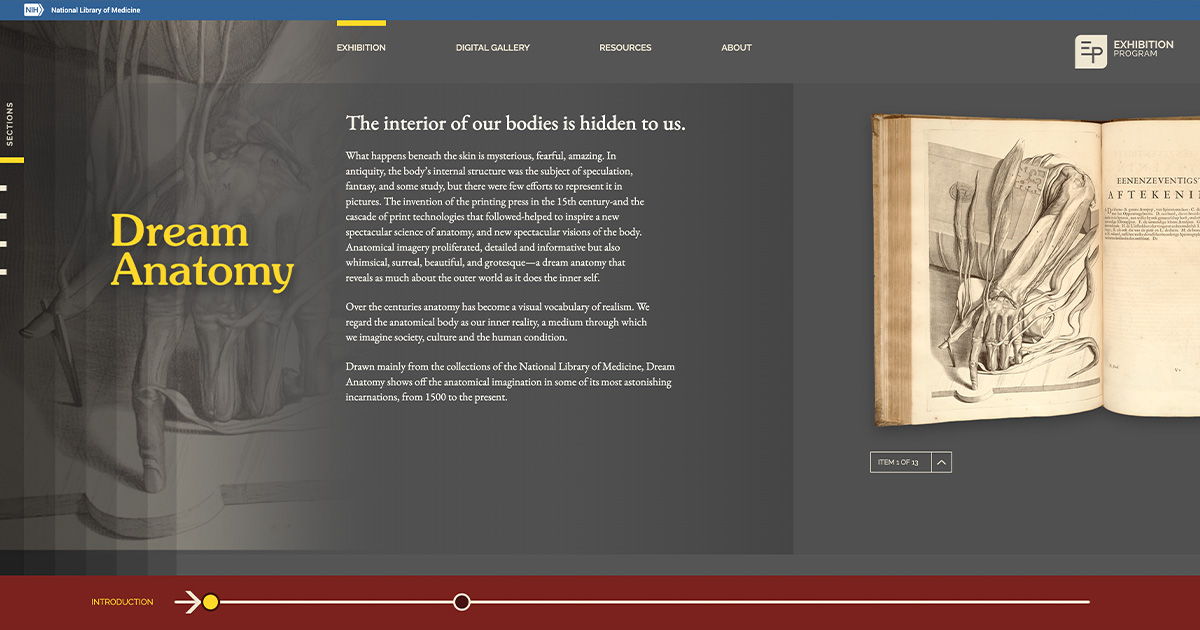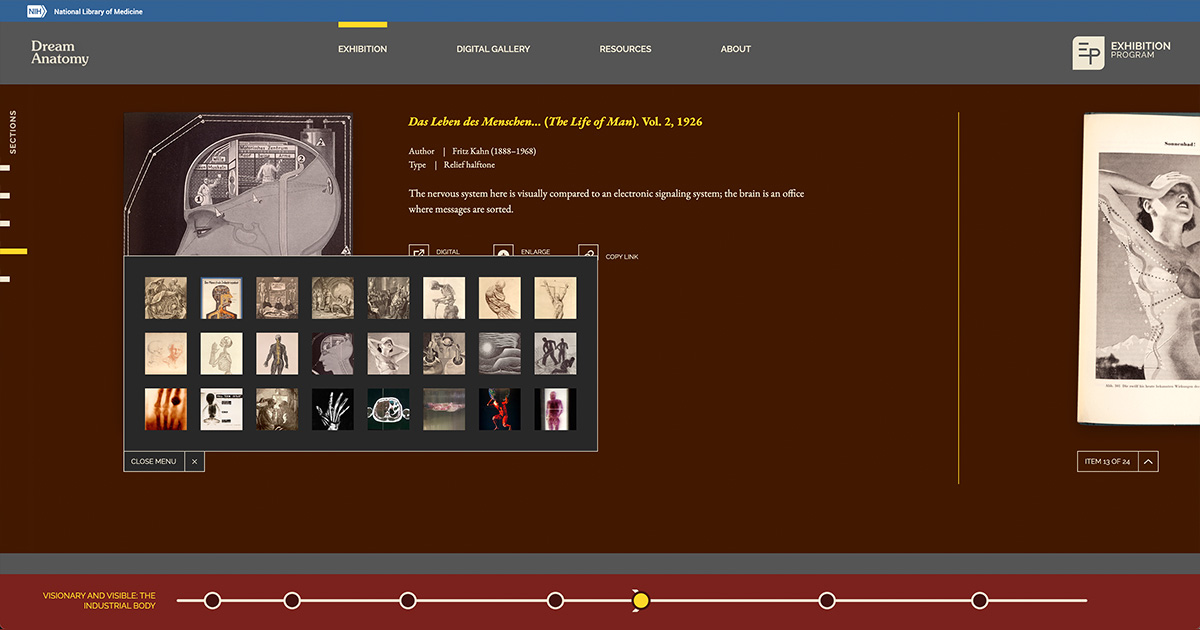
PRESS RELEASE
Astriata Creates a Responsive Web Design to Make Virtual Exhibits More Viewer-Centered and Interactive for the National Library of Medicine
share this post
Baltimore, MD (Oct. 27, 2022)— Developing a way for viewers from all over the world to effectively experience a digital exhibition of anatomical imagery in a non-linear fashion takes ingenuity and skill. Yet that’s what Astriata, a creative agency with expertise in developing human-centered digital experiences, achieved this month for the National Institute of Health’s National Library of Medicine (NLM), in Bethesda, Maryland.
The virtual exhibit, Dream Anatomy, features a collection of anatomical engravings, lithographs, photographs, and other imagery from just after the advent of the printing press in the 15th century to the present day. Included among the collection are images that depict human anatomy in a “detailed and informative but also whimsical, surreal, beautiful, and grotesque” manner—hence the title Dream Anatomy, full of imagery that “reveals as much about the outer world as it does the inner self,” the introduction of the exhibit reads.
 NLM originally created Dream Anatomy in 2002 and partnered recently with Astriata to develop a template to update and relaunch the exhibit by making it more responsive and exploratory. For this project, the organization needed a flexible, adaptable template it could use to refresh and relaunch not only Dream Anatomy but also other legacy exhibits, available at no cost to educators, professionals, and the general public. They also wanted to create a new kind of user experience—one that encourages viewers to follow their own instincts and interests, while constructing their own stories as they experience the exhibit, instead of moving in a linear fashion from point A to point Z.
NLM originally created Dream Anatomy in 2002 and partnered recently with Astriata to develop a template to update and relaunch the exhibit by making it more responsive and exploratory. For this project, the organization needed a flexible, adaptable template it could use to refresh and relaunch not only Dream Anatomy but also other legacy exhibits, available at no cost to educators, professionals, and the general public. They also wanted to create a new kind of user experience—one that encourages viewers to follow their own instincts and interests, while constructing their own stories as they experience the exhibit, instead of moving in a linear fashion from point A to point Z.
As a solution, Astriata created a template devoid of the original design’s vertically-oriented linear experience. In Dream Anatomy, for example, viewers can access themes within the exhibit narrative and supporting images through a side navigation—or by dragging or clicking the slide bar at the bottom and moving horizontally through each theme. They can also click within a single slide to access a gallery of thumbnail images. A simple click will take them to an image of choice, with accompanying information that provides socio-historical context, plus information about the imaging technique. For instance, in a mezzotint (or kind of engraving) from 18th-century France, one encounters a powerful image of a dark-haired woman standing with her arms crossed, gazing directly at viewers. While her head and face are depicted as seen in real life, with the skin on, her entire body is shown as though her skin has been removed, revealing an intricate display of interwoven muscles and veins—and a baby sitting upright, in a breech position, in her belly.
 From this single image, viewers can choose to enlarge the image and scrutinize the rich hues that characterize the art of the mezzotint; access the publication from which the mezzotint comes; copy and share a link to the page; or continuing exploring Dream Anatomy, whether by moving to the next slide or choosing to jump to another part of the exhibit.
From this single image, viewers can choose to enlarge the image and scrutinize the rich hues that characterize the art of the mezzotint; access the publication from which the mezzotint comes; copy and share a link to the page; or continuing exploring Dream Anatomy, whether by moving to the next slide or choosing to jump to another part of the exhibit.
“With Dream Anatomy and the new template design, our goal was to empower users to make their own decisions as they interact with NLM’s incredibly unique collection and content,” says Aline Lin, the CEO and creative director of Astriata. “This is exactly the kind of challenge we love to take on at Astriata, and we’re thrilled to give the public an updated, more learner-centered experience with NLM’s amazing compilation of curated exhibitions and educational resources.”
Visit the online exhibit, Dream Anatomy.
About Astriata
Astriata combines purposeful design and technology with human insights from usability testing to create meaningful customer and user experiences. Our award-winning services span branding, web design and development, CMS implementation, print design, animation, digital marketing, and usability testing with our proprietary application, UserHappy®. Serving clients across the United States in the association, healthcare, non-profit, higher education, and government sectors, we are a Maryland-certified woman-owned, minority-owned small business, with a central office in Baltimore, Maryland. Visit us at astriata.com.